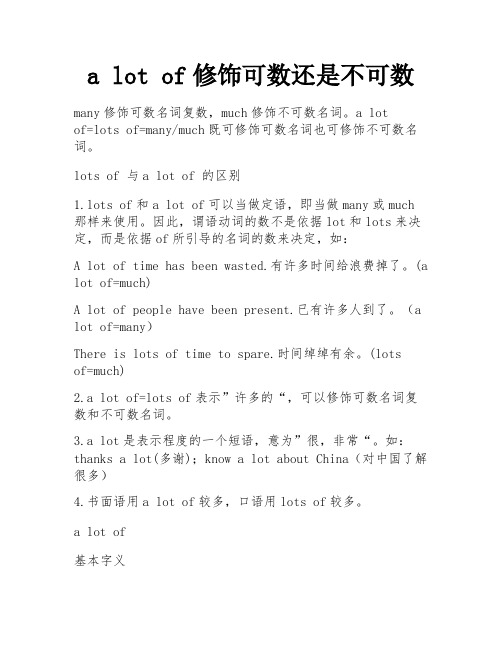many,much与alotof等用法辨异
英语中many、much、alotof用法

英语中many、much、alotof用法
1、many 修饰可数名词
I have many books.我有许多书。
many作主语时谓语动词用复数。
Many books are new.许多书是新的。
2、much 修饰不可数名词
There is much water in the glass.杯子里有许多水。
much作主语时谓语动词用单数。
Much time has been wasted.有许多时间给浪费掉了。
3、a lot of修饰可数名词和不可数名词
There are a lot of(many) people in my family.我家有许多人。
There is a lot of(much) time to us.对于我们来说还有许多时间。
a lot of引导名词做主语时,谓语动词的数不是复数,而是根据of 所引导的名词的数来决定。
A lot of(Lots of) people have been here。
许多人都在这。
A lot of(Lots of)money was lost.许多钱都丢了。
a lot比较级用法

a lot比较级用法A Lot 比较级用法“A lot”是英语中一个常见的表达方式,通常用来表示数量或程度的增加。
在日常生活中,我们经常听到人们使用“a lot”这个短语,但是很多人并不清楚它的具体用法。
本文将详细介绍“A lot”比较级的各种用法。
一、“A lot”比较级的基本含义“A lot”的基本含义是“很多”,通常用来表示数量或程度的增加。
比如:1. I have a lot of friends.(我有很多朋友。
)2. She has a lot of experience in teaching.(她在教学方面有很多经验。
)3. The weather is a lot colder today than it was yesterday.(今天的天气比昨天冷得多。
)二、“A lot”比较级与“much”和“many”的区别虽然“A lot”和“much”、“many”都可以表示数量或程度的增加,但它们之间还是存在一些区别。
1. Much 和 many 通常只能修饰不可数名词和可数名词复数形式,而a lot 可以修饰任何名词。
例如:- There is much water in the bottle.- There are many apples on the table.- He has a lot of money.2. Much 和 many 只能用于否定句、疑问句和条件句中,而 a lot 可以用于肯定句和否定句中。
例如:- I don't have much time.- Do you have many friends?- If he studies a lot, he will pass the exam.3. Much 和 many 在修饰数量较少的情况下会显得过于正式,而 a lot 则更为口语化。
例如:- I don't have much money. (过于正式)- I don't have a lot of money. (更为口语化)三、“A lot”比较级与“very”和“really”的区别“A lot”比较级与“very”和“really”的用法也有所不同。
any,much,many,lots of,a lot of,some 的用法

any,much,many,lots of,a lot of,some 的用法some和any:1.some和any都可指“一些”,但some常用于肯定句中,any常用于否定句、疑问句、和条件句中。
两者都可做主语、宾语和定语。
2.some有时也用于疑问句,表示说话者希望对方给予肯定的回答、邀请或料想对方会做肯定的回答,也可表示建议。
any有时也可用于肯定句中,表示“任何一个”,“任何一些”;not …any=no比如:Could I have some beer please ?(表明了说话者的礼貌和肯定的语气)She has any number of things she must do today.她今天又数不清的事要做。
3.“some of + …”结构后常跟可数名词的复数,此结构作主语时,谓语动词用复数;跟不可数名词,谓语动词用单数。
any后跟复数可数名词,any如若表示“任何一个”,谓语动词用单数,表示“任何一些”,谓语动词用复数,any后跟不可数名词,谓语动词用单数。
4.some和any既可以修饰、代替可数名词复数(作主语谓语用复数),也可以修饰或代替不可数名词与可数名词单数(作主语谓语用单数)。
many和much:1.many和much是表示数量的不定代词,在句中既可以充当名词,也可以充当形容词,可作主语、宾语、定语、表语等,意思为“许多”、“大量”。
many修饰或代替可数名词,much 修饰或代替不可数名词。
2.many作主语时谓语动词用复数,much作主语时谓语动词用单数。
名词前若有the/my/your/our/their/this/that/it/these/those等,此时不能直接用many/much,需用many of/much of。
3.many ,much前可有as、so、too、how等进行修饰;the,these,those可以修饰many;the,this,that可修饰much。
初中英语语法知识

some、any和many、much,a lot of 、plenty of 、a little、a few,too many,too much和much too的区别今天看一篇小文,忽然发现many和much用起来有区别,以前的语法都忘的差不多了,顺便就把能想起来的都查了一遍,做个大全供自己日后参考吧。
1、much,many,表示很多,前者用于形容词比较级及不可数名词,后者用于修饰可数名词;例:It's much easier now;There're much water in the tank;I have many books;2、some, any,表示一些,前者用于肯定陈述及委婉请求,后者用于否定句及一般疑问句;例:I have some books; Would you like some coffee? I don't have any books; Is there any coffee in your cup?3、a lot of, 相当于much,more的化身,但仅用于修饰名词,当后面接形容词比较级时,应为a lot;例:There is a lot of water in the tank; There'are a lot of books in my room; I'm a lot better now, thanks.4、more, 为much和many的比较级,后接名词(可数或不可数均可),或形容词;例:I have more books than him. I have more coffee than him; The book is more expensive.5、plenty of稍微复杂一点,用于口语表达时修饰不可数名词的程度而非数量多一些,但它也可以修饰可数名词,只是情况少些;6、a little, a few就没什么好说了吧,"一些",分别接不可数、形容词和可数名词~例:I have a little money;I'm a little hungry;I have a few books。
英语中表达“许多”的单词和短语,你知道多少

英语中表达“许多”的单词和短语,你知道多少请看下面的几个句子:1.We always get lots of nice presents at Christmas.2.Thanks a lot..3.There a lot of people in the dining hall.4.You don’t need to buy many cakes.5.Eating much meat is bad for your health.以上句子中的 lots of,a lot, a lot of,many, much都可以表示“许多”的意思,但意思有差别,下面我们来整理一下。
▉词义辨析1.many 许多,它的后面常跟可数名词的复数,如There are too many mistakes in your article. 在你的文章中有许多错误。
2. Much 许多它的后面常常跟不可数名词,如He drank too much last night. 昨天晚上他喝得太多了。
3. lots of, a lot of 都是许多的意思,用法基本相同,但lots of比较口语化,用在比较口语的场合中,如,There are lots of troubles in the world ! 世界上不幸的事真多呀!a lot of 通常作书面用语,用在比较正式的场合里,如 The boy had a lot of pocket money. 这男孩有许多零用钱。
4. a lot 是口语中的一个常用词组,多用于肯定句,有时也用于疑问句, 其主要用法有如下几点:A. 作名词短语,表示“很多;多量”,在句中作主语、宾语或表语,其后常有动词不定式短语作后置定语,如:I’m given her a lot to eat. (作宾语)This is a lot. (作表语)B. 作副词,在句中作程度状语,表示“很、非常、常常”, 如:It often rains a lot at this time of year. (修饰动词rain)Thanks a lot. (修饰感叹词thanks,thanks=thank you)C. a lot前面可被such,what,quite,rather修饰,如:I like him quite a lot.▉ 扩展资料1. a lot of 的同义词组:a great deal、of plenty of 【词义:许多…】A. a great deal of 大量,很多后接不可数名词,谓语动词用单数。
a lot of修饰可数还是不可数

a lot of修饰可数还是不可数many修饰可数名词复数,much修饰不可数名词。
a lotof=lots of=many/much既可修饰可数名词也可修饰不可数名词。
lots of 与a lot of 的区别1.lots of和a lot of可以当做定语,即当做many或much那样来使用。
因此,谓语动词的数不是依据lot和lots来决定,而是依据of所引导的名词的数来决定,如:A lot of time has been wasted.有许多时间给浪费掉了。
(a lot of=much)A lot of people have been present.已有许多人到了。
(a lot of=many)There is lots of time to spare.时间绰绰有余。
(lotsof=much)2.a lot of=lots of表示”许多的“,可以修饰可数名词复数和不可数名词。
3.a lot是表示程度的一个短语,意为”很,非常“。
如:thanks a lot(多谢);know a lot about China(对中国了解很多)4.书面语用a lot of较多,口语用lots of较多。
a lot of基本字义英[ə lɒt ɒv] 美[ə lɑːt əv]det.许多双语例句1.I am spending a lot of money and time on this boat, but it is worth it.我在这艘船上花了很多钱和时间,但很值。
2.I have lost a lot of weight.我体重减了不少。
3.Is there a lot of effort and money going into this sort of research?目前这类研究是否有大量的人力和资金投入?。
many,a lot of, much的区别

六年级英语毕业总复习School:Class:Name:many,a lot of, much的区别many,a lot of, much,这三个词都是表示“许多”。
many是用来修饰可数名词,much用来修饰不可数名词,a lot of则可以用来修饰可数与不可数名词。
如:Peter has many friends.(可数名词的前面)Peter has much food for his birthday party.(不可数名词的前面)Peter has a lot of friends.( 可数名词的前面)Peter has a lot of food for his birthday party. (不可数名词的前面)many, much, (a) little, (a) few的区别用法:(1)多用作定语many pupils few books a few shirtsmuch money little support a little sugar(2)有时也作主语、宾语、表语如:A few of us are from the south. (主语)Few (of us) have ever been to Tibet. (主语) (我们中间)很少人到过西藏。
There is still much to be done. (主语)I know little (don’t know much) about it. (宾语)You’re many, and they are few. (表语) 你们是多数,他们是少数。
(3)much 有时也作状语如:H likes playing football very much.(4)quite a few: 相当多、许多,修饰或代替可数名词复数如:There were quite a few foreigners there.1。
alotof修饰可数还是不可数

a lot of修饰可数还是不可数
many修饰可数名词复数,much修饰不可数名词。
a lot of=lots of=many/much既可修饰可数名词也可修饰不可数名词。
扩展资料
lots of 与a lot of 的.区别:
1、lots of和a lot of可以当做定语,即当做many或much那样来使用。
因此,谓语动词的数不是依据lot和lots来决定,而是依据of所引导的名词的数来决定,如:
A lot of time has been wasted.有许多时间给浪费掉了。
(a lot of=much)
A lot of people have been present.已有许多人到了。
(a lot of=many)
There is lots of time to spare.时间绰绰有余。
(lots of=much)
2、a lot of=lots of表示”许多的“,可以修饰可数名词复数和不可数名词。
3、a lot是表示程度的一个短语,意为”很,非常“。
如:thanks a lot(多谢);know a lot about China(对中国了解很多)
4、书面语用a lot of较多,口语用lots of较多。
- 1、下载文档前请自行甄别文档内容的完整性,平台不提供额外的编辑、内容补充、找答案等附加服务。
- 2、"仅部分预览"的文档,不可在线预览部分如存在完整性等问题,可反馈申请退款(可完整预览的文档不适用该条件!)。
- 3、如文档侵犯您的权益,请联系客服反馈,我们会尽快为您处理(人工客服工作时间:9:00-18:30)。
many,much与a lot of 等用法辨异
■崔长平河南遂平一高(463100)
■基本用法比较表:
1.在肯定句中(尤其是对宾语进行修饰时)多使用等换词;在疑问句、否定句中多用many和much。
. He earns a lot of money in his new job. (肯定句)
Does he earn much money in his new job (疑问句)
He does not earn much money in his new job. (否定句)
The television company receives a large number of letters every week. (肯定句)
Does the television company receive many letters every week (疑问句)
The television company does not receive many letters every week. (否定句)
Scientists have spent a great deal of time studying this problem. (肯定句)
Scientists have not spent much time on this problem. (否定句)
They don′t plant many trees,but they plant a lot of flowers.
I have not got much money but I have got a lot of time.
He doesn’t talk much,but he thinks a lot.
2.在肯定句中用作主语或修饰主语时,many和much经常用在句首。
. Many of us were too tired to go further.
There are many, many reasons against it.
Much has been said.
Much of what you said is true.
Much money has been wasted that way.
3.接受not,how,too,as,so,very,a great,a good等修饰时,要用many或much。
. I have a few, but not many.
I read a great many English novels.
Not many of us will pass the examination.
You have given me too many.
There are so many that I cannot choose.
And how much did you pay。
